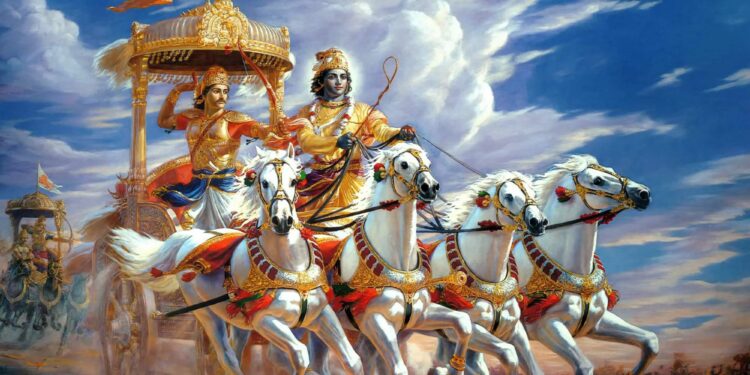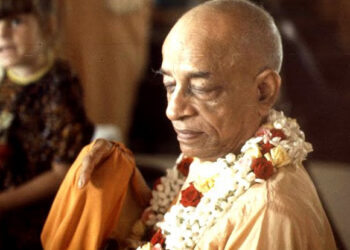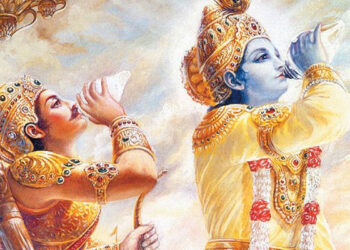TEXT 15
yuñjann evaṁ sadātmānaṁ
yogī niyata-mānasaḥ
śāntiṁ nirvāṇa-paramāṁ
mat-saṁsthām adhigacchati
SYNONYMS
yuñjan—practicing; evam—as mentioned above; sadā—constantly; ātmānam—body, mind and soul; yogī—the mystic transcendentalist; niyata-mānasaḥ—with a regulated mind; śāntim—peace; nirvāṇa-paramām—cessation of material existence; mat—saṁsthām—the spiritual sky (the kingdom of God); adhigacchati—does attain.
TRANSLATION
Thus practicing constant control of the body, mind and activities, the mystic transcendentalist, his mind regulated, attains to the kingdom of God [or the abode of Kṛṣṇa] by cessation of material existence.
PURPORT
The ultimate goal in practicing yoga is now clearly explained. Yoga practice is not meant for attaining any kind of material facility; it is to enable the cessation of all material existence. One who seeks an improvement in health or aspires after material perfection is no yogī according to Bhagavad-gītā. Nor does cessation of material existence entail one’s entering into “the void,” which is only a myth. There is no void anywhere within the creation of the Lord. Rather, the cessation of material existence enables one to enter into the spiritual sky, the abode of the Lord. The abode of the Lord is also clearly described in the Bhagavad-gītā as that place where there is no need of sun, moon or electricity. All the planets in the spiritual kingdom are self-illuminated like the sun in the material sky. The kingdom of God is everywhere, but the spiritual sky and the planets thereof are called paraṁ dhāma, or superior abodes.
A consummate yogī, who is perfect in understanding Lord Kṛṣṇa, as is clearly stated herein by the Lord Himself (mat-cittaḥ, mat-paraḥ, mat-sthānam), can attain real peace and can ultimately reach His supreme abode, Kṛṣṇaloka, known as Goloka Vṛndāvana. In the Brahma-saṁhitā (5.37) it is clearly stated, goloka eva nivasaty akhilātma-bhūtaḥ: the Lord, although residing always in His abode called Goloka, is the all-pervading Brahman and the localized Paramātmā as well by dint of His superior spiritual energies. No one can reach the spiritual sky (Vaikuṇṭha) or enter into the Lord’s eternal abode (Goloka Vṛndāvana) without the proper understanding of Kṛṣṇa and His plenary expansion Viṣṇu. Therefore a person working in Kṛṣṇa consciousness is the perfect yogī, because his mind is always absorbed in Kṛṣṇa’s activities (sa vai manaḥ kṛṣṇa-pādāravindayoḥ [SB 9.4.18]). In the Vedas also (Śvetāśvatara Upaniṣad 3.8) we learn, tam eva viditvāti mṛtyum eti: “One can overcome the path of birth and death only by understanding the Supreme Personality of Godhead, Kṛṣṇa.” In other words, perfection of the yoga system is the attainment of freedom from material existence and not some magical jugglery or gymnastic feats to befool innocent people.
TEXT 16
nāty-aśnatas ‘tu yogo ‘sti
na caikāntam anaśnataḥ
na cāti-svapna-śīlasya
jāgrato naiva cārjuna
SYNONYMS
na—never; ati—too much; aśnataḥ—of one who eats; tu—but; yogaḥ—linking with the Supreme; asti—there is; na—nor; ca—also; ekāntam—overly; anaśnataḥ—abstaining from eating; na—nor; ca—also; ati—too much; svapna-śīlasya—of one who sleeps; jāgrataḥ—or one who keeps night watch too much; na—not; eva—ever; ca—and; arjuna—O Arjuna.
TRANSLATION
There is no possibility of one’s becoming a yogī, O Arjuna, if one eats too much or eats too little, sleeps too much or does not sleep enough.
PURPORT
Regulation of diet and sleep is recommended herein for the yogīs. Too much eating means eating more than is required to keep the body and soul together. There is no need for men to eat animals, because there is an ample supply of grains, vegetables, fruits and milk. Such simple foodstuff is considered to be in the mode of goodness according to the Bhagavad-gītā. Animal food is for those in the mode of ignorance. Therefore, those who indulge in animal food, drinking, smoking and eating food which is not first offered to Kṛṣṇa will suffer sinful reactions because of eating only polluted things. Bhuñjate te tv aghaṁ pāpā ye pacanty ātma-kāraṇāt. Anyone who eats for sense pleasure, or cooks for himself, not offering his food to Kṛṣṇa, eats only sin. One who eats sin and eats more than is allotted to him cannot execute perfect yoga. It is best that one eat only the remnants of foodstuff offered to Kṛṣṇa. A person in Kṛṣṇa consciousness does not eat anything which is not first offered to Kṛṣṇa. Therefore, only the Kṛṣṇa conscious person can attain perfection in yoga practice. Nor can one who artificially abstains from eating, manufacturing his own personal process of fasting, practice yoga. The Kṛṣṇa conscious person observes fasting as it is recommended in the scriptures. He does not fast or eat more than is required, and he is thus competent to perform yoga practice. One who eats more than required will dream very much while sleeping, and he must consequently sleep more than is required. One should not sleep more than six hours daily. One who sleeps more than six hours out of twenty-four is certainly influenced by the mode of ignorance. A person in the mode of ignorance is lazy and prone to sleep a great deal. Such a person cannot perform yoga.



















